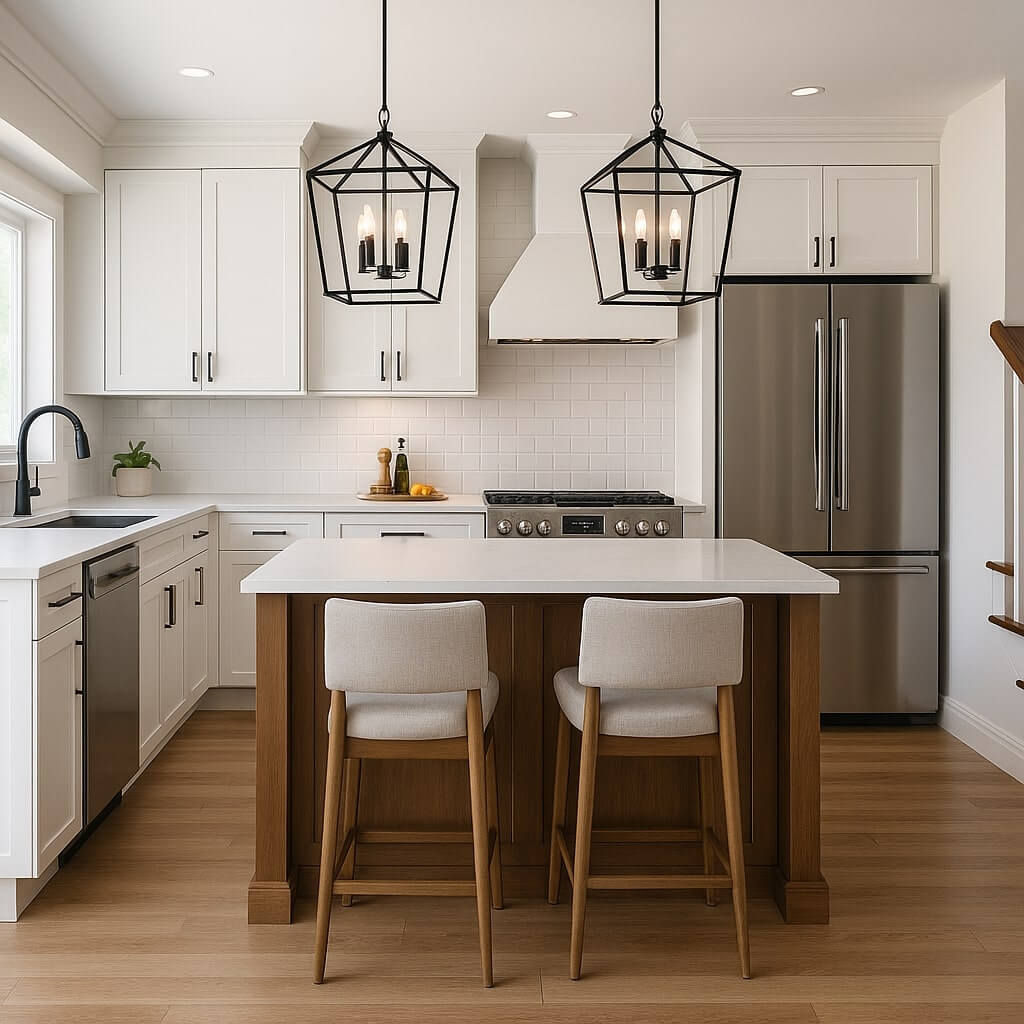When you’re considering a kitchen remodel in Chicago, understanding the average costs is essential for your budget. From cabinetry and countertops to flooring and appliances, every aspect can greatly impact your wallet. Labor and design fees also play an important role in the overall expense. So, what should you expect regarding costs? Let’s break down the key components to help you plan effectively.
Key Takeaways
- Custom cabinetry typically ranges from $15,000 to $30,000, depending on materials and design preferences.
- Countertops account for 20% to 40% of total remodel costs, averaging $2,000 to $5,000.
- Flooring costs vary widely, with hardwood averaging $8-$12, laminate $2-$5, and tile $5-$10 per square foot.
- Appliance upgrades can range from $2,000 to $10,000, depending on features and energy efficiency.
- Labor costs in Chicago can be between $50 and $150 per hour, making up 20% to 35% of total expenses.
Cabinetry and Hardware Costs
When you’re planning a kitchen remodel in Chicago, one of the biggest expenses you’ll encounter is cabinetry and hardware.
Custom cabinetry offers both style and functionality, allowing you to maximize your kitchen’s layout. You’ll want to reflect on your storage needs, material choices, and design preferences, as these factors influence costs considerably.
Custom cabinetry combines style and practicality, optimizing your kitchen layout while considering storage needs and design choices.
Don’t overlook the variety of hardware options available, from sleek handles to decorative knobs, which can elevate your cabinetry’s overall look.
Investing wisely in both custom cabinetry and quality hardware can enhance your kitchen’s appeal and increase your home’s value, making it a worthwhile expenditure.
Countertop Expenses
When you’re choosing a countertop for your kitchen remodel, the material you select greatly impacts both your budget and the overall look of your space.
From granite to laminate, each option comes with its own price tag and installation costs you should factor in.
Understanding these expenses can help you make a more informed decision that fits your style and financial plan.
Material Type Impact
Countertops typically account for a significant portion of your kitchen remodel budget, often ranging from 20% to 40% of the total costs.
The material quality you choose greatly influences not only the price but also the longevity and aesthetics of your kitchen. For instance, granite and quartz are popular due to their durability, yet they come with higher price tags.
Alternatively, laminate offers a budget-friendly option. Your installation techniques can also affect overall costs; precision and expertise are essential for high-end materials.
Ultimately, selecting the right combination of material and installation can enhance your kitchen’s beauty and functionality.
Installation Costs Overview
Choosing the right countertops is just the beginning; understanding installation costs is equally important for your kitchen remodel budget.
Depending on the material you choose, installation techniques can vary greatly. For instance, granite might require professional installation due to its weight and complexity, while laminate could be a DIY option.
Generally, you should expect the installation timeline to take a few days, factoring in measurements, fabrication, and actual installation. Budgeting around $30 to $150 per square foot for installation can help you plan effectively.
Flooring Investments
Although flooring may seem like a minor detail in a kitchen remodel, it greatly impacts both aesthetics and functionality. Choosing the right flooring materials, like hardwood, laminate, or tile, is essential for your kitchen’s vibe. Additionally, understanding installation techniques can save you time and money.
| Flooring Material | Average Cost per Square Foot |
|---|---|
| Hardwood | $8 – $12 |
| Laminate | $2 – $5 |
| Tile | $5 – $10 |
Investing in quality flooring will enhance your kitchen’s appeal and durability, ensuring you enjoy your space for years to come.
Appliance Purchases
Upgrading your kitchen appliances is a pivotal aspect of any remodel, as these essential tools enhance both functionality and efficiency.
When selecting appliances, consider investing in energy efficient appliances to save on utility bills and reduce your carbon footprint. Don’t forget about appliance warranties, as they offer peace of mind and protect your investment.
Here are a few key features to look for:
- Energy Star ratings for efficiency
- Smart technology for convenience
- Durability and style that match your kitchen design
With the right choices, your kitchen won’t only look great but also perform exceptionally well.
Plumbing and Electrical Work
When planning your kitchen remodel, addressing plumbing and electrical work is essential for ensuring safety and functionality.
You’ll want to evaluate plumbing upgrades, like installing new pipes or fixtures to prevent leaks and improve water flow. Upgrading your sink or dishwasher can enhance efficiency too.
On the electrical side, electrical upgrades are vital for supporting modern appliances and ensuring your kitchen meets code requirements. Installing additional outlets or dedicated circuits can prevent overloads and enhance convenience.
Labor Costs
When planning your kitchen remodel in Chicago, understanding labor costs is essential.
Average labor rates can vary greatly based on expertise and location, so knowing what influences these costs helps you budget effectively.
You’ll also need to evaluate whether hiring professionals or tackling the work yourself makes the most sense for your project.
Average Labor Rates
Labor costs play a significant role in your kitchen remodel budget, often accounting for about 20% to 35% of the total expenses. Understanding average labor rates in Chicago can help you plan effectively.
Currently, average wage trends indicate that skilled labor is in high demand, impacting your costs in the labor market.
Consider these factors when budgeting for labor:
- Hourly rates: Expect to pay between $50 to $150 per hour for skilled trades.
- Project complexity: More intricate designs may require specialized labor, increasing costs.
- Permits and inspections: Factor in any additional fees associated with your remodel.
Factors Influencing Costs
Several factors can greatly influence labor costs in your kitchen remodel.
First, the complexity of your kitchen layout plays an essential role; more intricate designs require skilled labor, increasing costs.
Additionally, if you’re planning a tight renovation timeline, you might need to pay for expedited services, which can further escalate labor expenses.
Seasonal demand also affects rates—contractors may charge more during peak remodeling months.
Ultimately, the experience and qualifications of your chosen laborers can vary, impacting your overall budget considerably.
Hiring Professionals vs. DIY
Deciding whether to hire professionals or tackle a kitchen remodel yourself can greatly impact your budget. Each option has its pros and cons, so it’s vital to weigh them carefully against your project timeline.
- Hiring Professionals: Guarantees quality work and saves time but can be costly.
- DIY: Cuts labor costs and allows for creative control but may lead to mistakes and delays.
- Consider Your Skills: Assess your abilities and the complexity of the project to determine the best route for you.
Ultimately, your decision should align with your budget, skills, and how quickly you want the remodel completed.
Design and Permit Fees
When planning your kitchen remodel in Chicago, it’s crucial to factor in design and permit fees, which can considerably impact your overall budget.
Design trends evolve, and hiring a professional designer often comes with a fee, but their expertise can align your vision with current styles.
Additionally, maneuvering through the permit processes can be tricky; you’ll need to obtain the right permits to avoid fines or delays. Permit fees vary based on your project’s scale, so it’s wise to research local regulations beforehand.
Conclusion
In conclusion, understanding the average kitchen remodel costs in Chicago can help you budget effectively. From cabinetry and countertops to flooring and labor, each element plays a vital role in your overall expenses. By being aware of these costs, you can make informed decisions and create the kitchen of your dreams without breaking the bank. So, take the time to plan and prioritize your investments, ensuring a successful and satisfying remodel experience.




